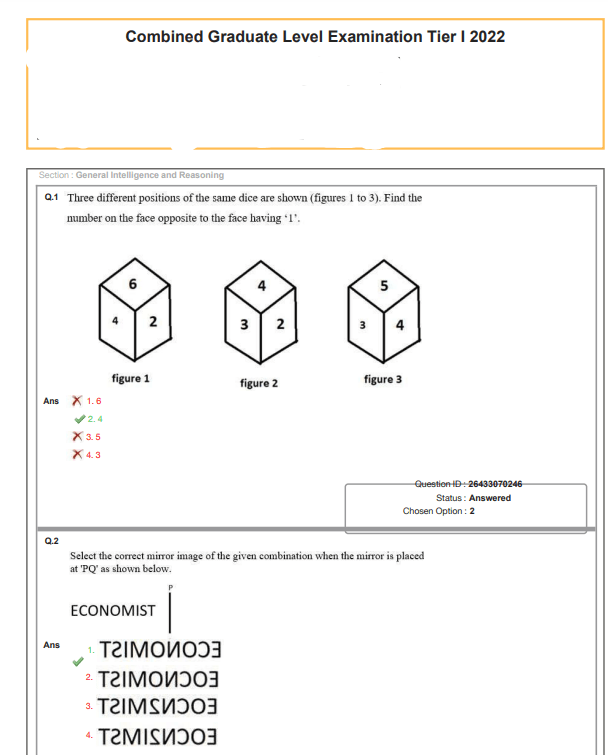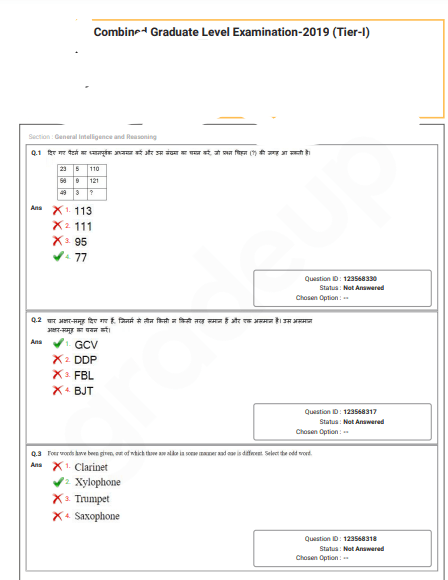Venture into the archives of SSC Question paper! Explore this repository of historical assessments, providing priceless insights into examination structures, covered subject matters, and inquiry formats. Prepare yourself for an immersive journey of comprehensive study and tactical education as you uncover the strategies for mastering the SSC examinations.
Introduction to SSC Question paper
Particulars |
Details |
|---|---|
| Exam Name | SSC CGL (Staff Selection Commission Combined Graduate Level) |
| Conducting Body | Staff Selection Commission (SSC) |
| Exam Level | National Level |
| Exam Frequency | Once a year |
| SSC CGL Application 2024 Start Date | 11-Jun-2024 |
| Last Date to Apply for SSC CGL 2024 | 10-Jul-2024 |
| Vacancies | To be notified |
| Age-Limit | Minimum Age Limit – 18 Maximum Age Limit – 32 Age will be calculated from August 1, 2024 |
| Exam Duration | Tier-I: 60 minutes (online) Tier-II: Paper 1 – 150 Minutes Paper 2 – 120 Minutes Paper 3 – 120 Minutes |
| Application fee | INR 100 |
| Exam Purpose | Selection of candidates for Group B and C posts in ministries/departments/organisations of the Government of India |
Download: SSC Question paper


| SSC Question paper PDF Download | ||
| Paper Title | Paper with solution | |
|---|---|---|
| SSC Examination-1 | Click Here | |
| SSC CGL last year question paper | Click Here | |
| SSC CGL Previous year paper | Click Here | |
| SSC CPO paper | Click Here | |
| SSC SHSL paper | Click Here | |
Syllabus of SSC Question paper
Quantitative Aptitude:
Key Topics:
– Arithmetic (Percentages, Ratio and Proportion, Time and Work).
– Algebra, Geometry, and Trigonometry.
– Data Interpretation and Analysis.
Crucial Concepts:
– Mathematical formulas and their applications.
– Problem-solving techniques for complex equations.
– Interpretation skills for data-related questions.
Recurring Question Patterns:
– Consistent emphasis on algebraic equations.
– Frequent appearance of geometry-based problems.
– Varied scenarios in data interpretation.
English Language and Comprehension:
Key Topics:
– Grammar rules and their application.
– Vocabulary (Synonyms, Antonyms, Idioms).
– Reading Comprehension.
Crucial Concepts:
– Sentence structure and formation.
– Contextual usage of words.
– Comprehension skills and inference.
Recurring Question Patterns:
– Grammar-based error detection.
– Vocabulary-intensive questions.
– Varied formats of reading comprehension passages.
General Awareness:
Key Topics:
– Current Affairs (National and International).
– History, Geography, and Polity.
– Science and Technology.
Crucial Concepts:
– Timely awareness of current events.
– Historical timelines and key milestones.
– Understanding of governmental structures.
Recurring Question Patterns:
– Current affairs-based questions.
– Historical events and their significance.
– Application-based queries on scientific principles.
Reasoning Ability:
Key Topics:
– Logical Reasoning.
– Analytical Puzzles.
– Coding-Decoding.
Crucial Concepts:
– Deductive and inductive reasoning.
– Pattern recognition.
– Algorithmic problem-solving.
Recurring Question Patterns:
– Consistent inclusion of logical puzzles.
– Varied coding and decoding scenarios.
– Application-based analytical questions
Eligibility criteria for SSC Question paper
- Nationality: Eligibility requirements dictate that candidates must hold citizenship in India, Nepal, Bhutan, or be Tibetan refugees who entered India before January 1st, 1962, with the intent of establishing permanent residency. Furthermore, individuals of Indian descent who relocated from Pakistan, Burma, Sri Lanka, and select East African nations with the aim of settling permanently in India also meet the criteria.
- Age Limit: No specific age constraints apply to accessing the SSC Last Year Question Paper. It is accessible to candidates across all age brackets.
- Educational Qualification: Candidates hailing from diverse educational backgrounds possess the eligibility to avail themselves of the SSC(Staff Selection Commission)Last Year Question Paper. No particular educational prerequisites are stipulated.
- Other Requirements: No supplementary prerequisites or limitations are imposed on accessing the SSC Last Year Question Paper. It remains accessible to all prospective candidates without any additional conditions.
Tips and Strategies for Effective Preparation
- Learn Syllabus Carefully: Learn every topic covered in the syllabus, including the chapters, poetry, grammatical rules, and composition subjects. Make sure you are prepared for the exam.
- Frequent Practice: To enhance your abilities, practice writing assignments and reading comprehension on a frequent basis.
- Concentrate on Writing: Writing abilities should receive particular attention because they are essential to achieve high exam scores. Write stories, letters, and essays as practice to get good marks in the writing section.
- Solve Previous Year Question Papers: Examine past year’s question papers to gain insight into the format and nature of the questions. It will also assist you with time management.
Revise Often: To help you remember material and enhance your comprehension, go back and review chapters, poetry, and grammar rules on a frequent basis. - Remain Positive and Confident: Remain upbeat and assured of your skills. Have faith in your readiness and in yourself.
- Maintain Your Health: Make sure you’re eating right, getting enough sleep, and exercising on a regular basis. A sound body promotes a sound mind, which is necessary for studying for exams.
Analyzing Common Challenges Faced
Starting an educational path frequently means facing typical obstacles that learners face. Identifying these obstacles is the first step in creating winning plans to get over them. Here, we examine a few common issues that students encounter:
- Time management: It might be difficult to strike a balance between extracurricular activity and academic obligations. It can be difficult for students to set aside enough time for each topic or to stick to a regular study schedule.
- Procrastination: The propensity to put off work can make progress difficult. Procrastination frequently stems from a lack of drive or a sense of overwhelm, which makes it difficult to make the most of study time.
- Subject Comprehension: It might be difficult to understand complicated ideas, particularly in areas like science or mathematics. Inadequate study materials or unclear teaching strategies could be part of the problem.
- Exam Anxiety: People frequently struggle with anxiety and nervousness before exams. Stress levels can rise as a result of performance pressure, exam format confusion, or fear of failing.
- Distractions: Social interactions, technological diversions, or a disorganized study space can take attention away from concentrated study periods, which can affect focus and productivity.
- Lack of Resources: Insufficient study materials or restricted access to resources may make thorough preparation difficult. Students that encounter this obstacle could find it difficult to locate additional resources or different teaching aids.
- Motivation and Burnout: It might be difficult to maintain motivation for an extended amount of time. Burnout is a condition marked by physical and mental tiredness and can be brought on by persistently demanding academic work under pressure.
FAQs : SSC Question paper
Q: What is the significance of solving SSC previous year question papers?
A- Solving SSC previous year question papers helps in understanding the exam pattern, familiarizing with the types of questions asked, and assessing one’s preparation level.
Q: Are SSC previous year question papers available online?
A- Yes, SSC previous year question papers are available online on various websites and platforms for candidates to download and practice.
Q- How can solving SSC previous year question papers benefit in exam preparation?
A- Solving SSC previous year question papers aids in identifying weak areas, improving time management skills, and gaining confidence for the actual exam.
Q- Are there any tips for effectively utilizing SSC previous year question papers?
A- Yes, candidates should solve SSC previous year question papers regularly, analyze mistakes, revise concepts thoroughly, and focus on improving accuracy and speed.






